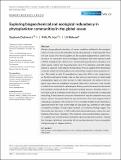Exploring biogeochemical and ecological redundancy in phytoplankton communities in the global ocean
Author(s)
Dutkiewicz, Stephanie; Boyd, Philip W; Riebesell, Ulf
DownloadPublished version (1.986Mb)
Publisher with Creative Commons License
Publisher with Creative Commons License
Creative Commons Attribution
Terms of use
Metadata
Show full item recordAbstract
© 2020 The Authors. Global Change Biology published by John Wiley & Sons Ltd. Climate-change-induced alterations of oceanic conditions will lead to the ecological niches of some marine phytoplankton species disappearing, at least regionally. How will such losses affect the ecosystem and the coupled biogeochemical cycles? Here, we couch this question in terms of ecological redundancy (will other species be able to fill the ecological roles of the extinct species) and biogeochemical redundancy (can other species replace their biogeochemical roles). Prior laboratory and field studies point to a spectrum in the degree of redundancy. We use a global three-dimensional computer model with diverse planktonic communities to explore these questions further. The model includes 35 phytoplankton types that differ in size, biogeochemical function and trophic strategy. We run two series of experiments in which single phytoplankton types are either partially or fully eliminated. The niches of the targeted types were not completely reoccupied, often with a reduction in the transfer of matter from autotrophs to heterotrophs. Primary production was often decreased, but sometimes increased due to reduction in grazing pressure. Complex trophic interactions (such as a decrease in the stocks of a predator's grazer) led to unexpected reshuffling of the community structure. Alterations in resource utilization may cause impacts beyond the regions where the type went extinct. Our results suggest a lack of redundancy, especially in the ‘knock on’ effects on higher trophic levels. Redundancy appeared lowest for types on the edges of trait space (e.g. smallest) or with unique competitive strategies. Though highly idealized, our modelling findings suggest that the results from laboratory or field studies often do not adequately capture the ramifications of functional redundancy. The modelled, often counterintuitive, responses—via complex food web interactions and bottom-up versus top-down controls—indicate that changes in planktonic community will be key determinants of future ocean global change ecology and biogeochemistry.
Date issued
2021Department
Massachusetts Institute of Technology. Department of Earth, Atmospheric, and Planetary Sciences; Massachusetts Institute of Technology. Center for Global Change ScienceJournal
Global Change Biology
Publisher
Wiley
Citation
Dutkiewicz, Stephanie, Boyd, Philip W and Riebesell, Ulf. 2021. "Exploring biogeochemical and ecological redundancy in phytoplankton communities in the global ocean." Global Change Biology, 27 (6).
Version: Final published version